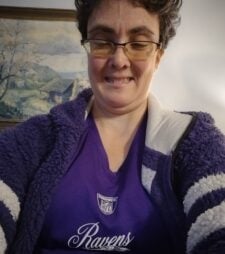 Kristin was diagnosed with Kabuki syndrome at age 11, and had her diagnosis confirmed with genetic testing when she was 27.
Kristin was diagnosed with Kabuki syndrome at age 11, and had her diagnosis confirmed with genetic testing when she was 27.
I was born medically at risk in Austin, Texas. Although doctors had no clue what condition I had, I had many medical procedures growing up, and genetics was always assumed to be involved.
As an infant, I was pronounced failure to thrive, which is when I started therapy at age 8 months. I was in the hospital a lot due to various infections. I had my eye ‘flipped” until it was corrected and I also had a cleft palate. I also always had loose joints, especially my knee, and was often called “floppy”. I also had a poor suckle, so I could never really use a regular bottle. I was always underweight, but we could never get food into me easily until after I had my second palate surgery, and then it was like night and day. I attended a special needs preschool starting at age 18 months. I was then mainstreamed, or in regular classes from K through 12th grade.
For me, I think what made it more difficult is that we moved twice between when I was born and age 10 due to my dad’s job, which meant always looking for new specialists and doctors. At age 10, we moved from Texas to Maryland. We followed up at Johns Hopkins pretty much right away because of my cleft palate. Hopkins used to sponsor a camp for kids born with cleft lip/palate, and it was at this camp in 1996 that I first heard the word Kabuki Syndrome mentioned by a doctor there. I was 11 years old when it was diagnosed clinically. Genetics were always assumed to be involved, but we never really knew to what extent.
In 2012, I had genetic testing done to confirm the Kabuki diagnosis (Type 1). My mom, who had been in denial, finally accepted the diagnosis. The genetic testing also introduced us to a new geneticist at Hopkins, as well as two doctors doing a fellowship under him. One of them I’m especially close to and I feel she understands me better then anyone. Eventually, that main geneticist moved to Iceland, so those being seen by him were transferred to one of the other geneticists. I now am seen by the one I met back in 2012, and she is a lifesaver for me. Now whenever I have a clinic visit with her (either for research or else a regular visit) she takes the full hour, and does about half an hour of exam, but she also takes the time to really listen to what I have to say, which I am so grateful for. I also know if I ever need to simply talk through something or am feeling stressed at all, I know I can send her an email, and she will help me by responding and knowing just what to say to calm me down.
Before the diagnosis, since we didn’t know what it was, my parents always wanted me to have a “normal” life (no news is good news so to speak). I did school and participated in activities, like gymnastics, horseback riding, Girl Scouts, swimming, piano lessons, and choir. Even through all of this, I still longed to be normal. Even after the initial clinical diagnosis, it was a challenge, because my mom didn’t want to accept it until the genetic test, because we now know Kabuki can cause intellectual delay, but didn’t know it was on a spectrum, meaning we didn’t know how severe or mild it was. Even to this day, once I allowed her to look at something I was working on for a speaking engagement with my doctor, she still tries to discredit my feelings and emotions with comments like “we were NOT desperate for a diagnosis – in fact if anything we were GLAD there was no diagnosis” (like, no news is good news). However, my mom does NOT live my life, and didn’t really understand how I felt at that time.
It did help me that my parents worked with me every night with my homework. My parents always wanted me to do MY BEST, not compared to others, but MINE. This is why my mom didn’t want to accept the diagnosis, because if she did, then the schools would have a reason NOT to have high standards for me. Sometimes it was hard for me, because I saw my older sister bringing home A’s every quarter, and I struggled with A’s and B’s, but it took my sister telling me “the world already has a me…it needs you being the best YOU that you can” and that quote from her really helped me a lot growing up.

Stay Connected
Sign up for updates straight to your inbox.
